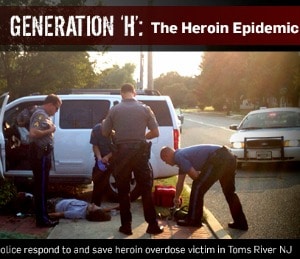
In this day and age of limited staffs, budget cuts, and failing all-news stations, 1010 WINS in New York City continues to do outstanding work. This most recent piece of news we’re going to detail is especially strong — it’s something only a handful of radio news operations would even attempt. It includes excellent reporting with very detailed news broadcasts, tackling an issue that has the local community by the jugular.
RI: Tell us about the heroin series?
Mevorach: This was different than anything we have done in the past both in terms of time, presentation, and utilization of all of our assets. We used the radio station as the megaphone for the coverage. We used our website for the multi-media content presentation, and we used our performance theatre for a video-taped panel discussion and demonstration of how to use the life-saving drug Narcan to reverse a heroin overdose. The entire process, from planning to execution, stretched three months. On-air components were not about doing a traditional series but rather about being the central hub for information, direction, and engagement. The radio station played a vital role in drawing people’s attention to our efforts, in registering people for our Long Island Wide Educational Summit on Heroin, (600 people attended), and in our overall coverage during this period. For example, the Summit was our lead story that day, the stories generated by our research were turned into on-air news stories, etc. but the overall goal was to use the strength of our brand on different platforms to reach as many demographics as possible. On-air we also launched a campaign to change the all too typical “not my child” mindset and replace it with “it could be anyone’s child.”
RI: Why did you decide to do this?
Mevorach: The heroin epidemic certainly isn’t new and we have been covering it in news
 content for a long time. Yet, with all of that talk and coverage about heroin, the epidemic is still growing. What is different now, I think, is that we are near the tipping point between talking about heroin addiction and taking substantial proactive steps to deal with it. With our reach of more than two million listeners, I felt the time was right to try and make that happen. When we first discussed taking this on, I did think there was a risk of people turning their radios off because they didn’t want to hear about the problem in such a substantial and consistent manner. However, once we saw where the story was taking us, I had zero percent doubt that it was the right thing for us to do.
content for a long time. Yet, with all of that talk and coverage about heroin, the epidemic is still growing. What is different now, I think, is that we are near the tipping point between talking about heroin addiction and taking substantial proactive steps to deal with it. With our reach of more than two million listeners, I felt the time was right to try and make that happen. When we first discussed taking this on, I did think there was a risk of people turning their radios off because they didn’t want to hear about the problem in such a substantial and consistent manner. However, once we saw where the story was taking us, I had zero percent doubt that it was the right thing for us to do.RI: What did you discover?
Mevorach: During our four weeks of research we traveled more than a hundred miles on a journey that took us from southern NJ to eastern Long Island. We rode along with police in Toms River, NJ, as they responded to a 9-1-1 call for a heroin overdose, we sat with a mother who shared the final text she received from her son before he died of an overdose while sitting on a Long Island Railroad train, we spoke with a young pregnant mom who is in rehab about the fears she has for her soon-to-be-born child, and we spoke with health officials, law enforcement, school administrators, and government officials about the epidemic.
RI: Did anything result from your reporting? Any government action?
Mevorach: We saw some immediate results. On Long Island for instance, the two counties (Nassau & Suffolk), each with its own government and agenda, came together for the first time to form a joint task force to combat heroin. The new task force will trace every single overdose back to the source so they have a coordinated effort in hunting down heroin dealers. It galvanized several Nassau County Schools to create ”Students Against Heroin,” an advocacy group that will work within high school and college campuses.
RI: What was the reaction from listeners?
Mevorach: Nearly 600 people attended our Educational Summit on Heroin. More than 5,000 people viewed it online. Two-hundred-and-fifty people received training on how to use Narcan, and we are getting requests every day from folks asking us to hold a summit in their community.
Listen – and Watch The 1010 WINS Special Reports:
9-1-1 call on a heroin overdose & ride along with responding police to the scene
The last text between a mother and son
Pregnant addict in recovery talks about her fears for her soon-to-be-born child
Learn about the one place your child may be hiding drugs that you never thought to look
Inspiring story of recovery from addiction
RI: This is rare for radio these days. Why was it important for you to do this?
Mevorach: It would have been easy to go down the path of “we don’t have the resources for this type of commitment” or “this isn’t what radio does anymore” but those are just excuses. I never allow, “we can’t do this” in my newsroom. If it’s important enough, there is always a way. This project was important because of the sheer magnitude of its reach. We didn’t find a single community that wasn’t touched by heroin. Part of our station’s mission statement states that we work “to improve the communities we serve,” and I think the heroin epidemic required a bold response to accomplish this.
RI: Do you think you’ll do more reporting like this?
Mevorach: Yes. We are already planning our next project. Our heroin coverage has resulted in so many requests for us to host other summits and to continue to push for action and change that we are looking to sponsor another one in the fall on Staten Island. I believe community-based, solution-driven coverage of major issues, presented on multiple platforms with radio as the central hub, is a very promising model for the future.
Reach out to Ben to congratulate him and his team at 1010 WINS for this excellent representation of radio mevorach@wins.com





